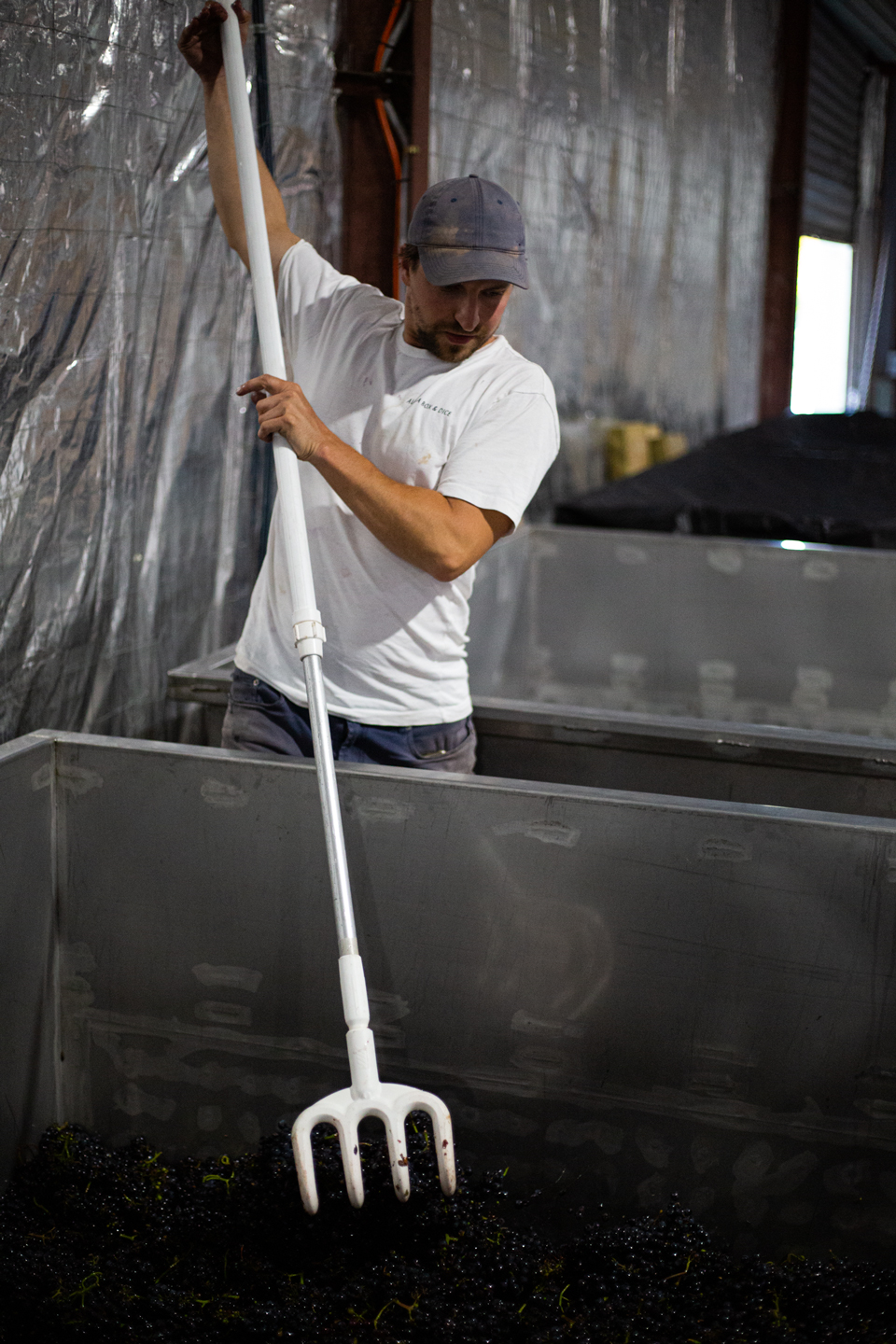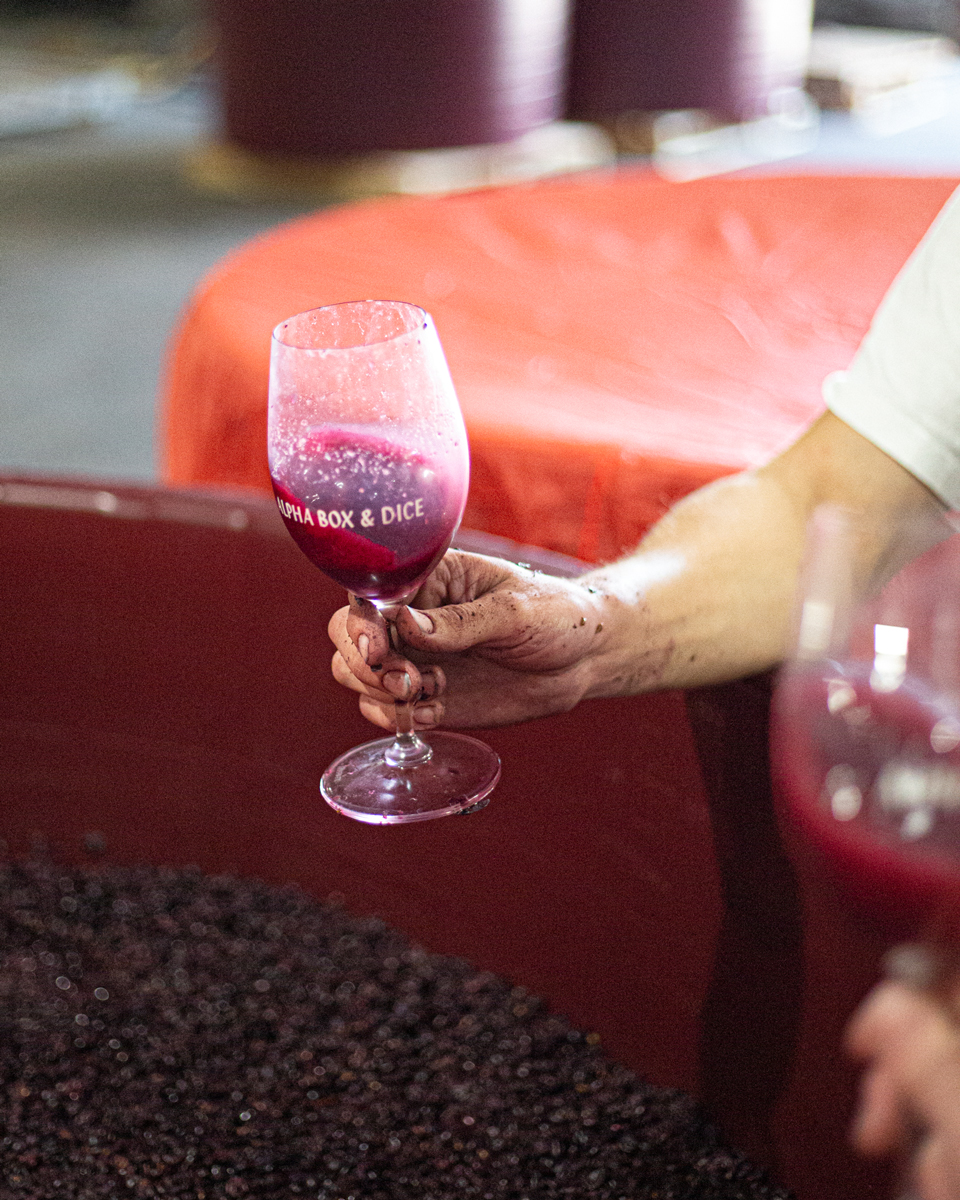Sam Berketa has been at the helm of McLaren Vale’s Alpha Box & Dice since 2015, making a flotilla of eccentric wines, from deep investigations into skin contact on white grapes, to unusual blends, alternative varieties – and lots of them – to a “reverse ripasso” produced from a perpetual master blend that has seen every variety and every vintage added to it. Those wines are part of the Alphabet of Wine, an ongoing exploration of the possibilities that South Australian vineyards can offer, and Berketa is constantly pushing those possibilities to the extreme.
Marking his seventh vintage at Alpha Box & Dice, Berketa notes that from 2021 things were a little different, with him finally moving all the operations onsite, with crushing and fermentation previously being conducted at a contract facility. “I have 100 per cent control over the winemaking direction and decisions from sourcing through to bottling,” he says. “We’re continuing to fine tune our processes and production methods, with the aim of increasing the quality of our wines being always at the fore. We just want to make wines that have a distinct personality while still showing varietal character, a sense of place and an expression that’s true to style. Wines with soul.”
Berketa entered the wine industry after transferring from a chemistry degree at The University of Adelaide to their viticulture and winemaking course. He worked for Serafino Wines in 2012, then completed his final placement with Mac Forbes in the Yarra Valley. That was in 2013, with a scholarship also taking him to the Rheinhessen, Germany, as a vintage winemaker in the same year.
The next vintage was spent with Peter Fraser at Yangarra in McLaren Vale, with a fulltime assistant winemaker position at Quealy Winemakers on the Mornington Peninsula following. At the end of 2015, Berketa accepted the head winemaker role at Alpha Box & Dice, at just 26, where has worked since, knitting in a vintage in Barolo with Chiara Boschis at E. Pira & Figli, as well as two vintages at Folktale Winery in Monterey County, USA.
Berketa has a big job, with over 30 wines in the portfolio and a vast array of varieties, styles and methods employed. He works with grapes from Alpha Box & Dice’s home region of McLaren Vale, as well as those from the Adelaide Hills, Langhorne Creek, Barossa Valley and the Riverland, and across a scarcely believable array of varieties, including montepulciano, sangiovese, nebbiolo, barbera, nero d’avola, aglianico, dolcetto, prosecco, tempranillo, carignan, touriga, chardonnay, semillon, riesling, pinot grigio, sauvignon blanc, muscat, grüner veltliner, chenin blanc, gewürztraminer, shiraz, durif, grenache and cabernet sauvignon.
“On one hand, I aim to share my love of the diversity of varieties and styles, and I’m fortunate to have a platform with which I can do that, given the safe tasting space that is the AB&D cellar door. On the other hand, I want to push these varieties further into the limelight by experimenting with things like single vineyard expressions of lesser-known varieties that I think are much better suited to particular sites than the classics.”
For Berketa, the matching of region to site is the essential starting point, with it considered holistically. “The selection of region needs to reflect the end style of wine I’m aiming to make, and showcase the unique characteristics that I think makes the wine truly individual. For example, I think the southern part of the Adelaide Hills is a great place. You get sunshine during the day and cold nights that are reflected in the depth of flavours, ripe tannins and tight acidities. But you wouldn’t grow nero there, which wants that Mediterranean atmosphere found in the Vale.”
The embracement of experimentation is critical for Berketa, from sourcing grapes to his approach to winemaking. “If you stick to rules, you’ll never make something exceptional. There are no absolutes in winemaking,” he says. That approach was very much a house style for Alpha Box & Dice before he arrived, but he is constantly pushing the limits, testing the possibilities.
“The ‘Golden Mullet Fury’ is an orange wine that has been a part of the AB&D line up since 2009, making it one of the oldest orange labels from Australia. But this is completely my take on the style, from using a blend of bright, skin-fermented semillon and botrytis-affected dry riesling to ageing the blend in foudre for 18 months.”
The range of wines is arrayed across Alpha Box & Dice’s “Alphabet of Wine”, with each letter symbolising an individual project, some of which represent a single wine, and sometimes four or five. There are just five letters unfulfilled at present, with the occupied ones capturing everything from varietal expressions to flights of winemaking fancy.
The Lazarus Ripasso project perhaps best represents the latter, with fractions of wine from every variety and vintage assembled into a perpetual master blend. Those portions represent wine that would otherwise be discarded, but are united to form an utterly unique whole. For each bottling that blend is passed over fresh grape skins (like the Italian Ripasso method from the Veneto, but in reverse, where fresh wine is passed over Amarone skins), refermented and bottled. It’s unique, to say the least.
“We definitely see the business growing in all areas over the next few years – being stagnant isn’t in our DNA,” says Berketa. “We’re always aiming to increase the quality and offering in every aspect of what we deliver and the way to do that for us is to grow sustainably. We’ve already begun heading down a path that sees a greater focus on the quality of fruit we source, locating the best vineyards for the styles of wine we’re creating, coupled with an investment in the cellar equipment to carry that quality through to the finished product.”
It is hard to generalise about Berketa’s approach, with so many varieties, eccentric blends and techniques at play. And while it would be true to say that his approach is to handcraft wines with minimal interference and inputs utilising indigenous yeasts and traditional winemaking methods used in innovative ways, Berketa is wary of classification. “I never add anything that doesn’t need to be there,” he says, simply. “I always prefer organic and biodynamic over conventional farming practices, as I believe that the grapes produced make better wines, but I’m not dogmatic about it. We like drinking interesting wines, fruit-forward yet elegant and structured, so it makes sense that’s the style of wine we love to make.”




